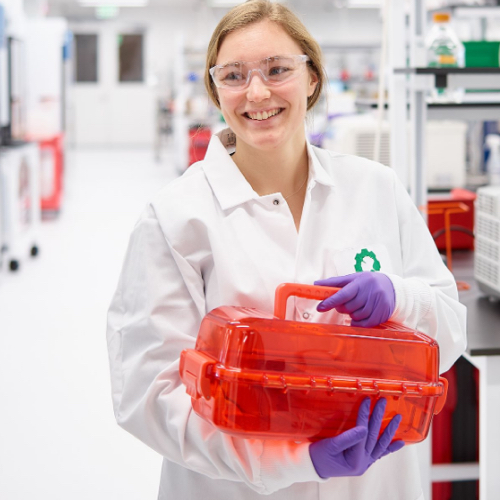Announcement Highlights:
- Planned transaction expands Ginkgo’s horizontal platform capabilities to support agricultural biologicals R&D from discovery through formulation and early field trials and will offer services to allow access to customers of all sizes in the agriculture industry
- Under the proposed transaction, Ginkgo to acquire Bayer’s West Sacramento agricultural biologicals site and team, adding a 175,000 square-foot R&D facility with pilot scale fermentation, formulation, and greenhouse facilities, along with access to Bayer’s large agricultural strain collection
- Joyn Bio, the joint-venture between Ginkgo and Leaps by Bayer formed in 2017, to be integrated into the parent companies, with the core technology platform becoming part of Ginkgo’s platform and key products being advanced by Bayer in a new collaboration
- Bayer to be an anchor customer of Ginkgo’s agricultural biologicals offering, signing a follow-on multi-year platform collaboration deal to enable continued development of Joyn Bio’s flagship nitrogen fixation program and launching new programs in fields including next-generation crop protection and carbon sequestration
We’re excited to announce plans to significantly expand our platform capabilities in agricultural biologicals from discovery to field. These capabilities will be built through a series of transactions; Ginkgo will acquire Bayer’s 175,000 square-foot West Sacramento Biologics Research & Development site, team, and internal discovery and lead optimization platform. Ginkgo will also integrate the R&D platform assets from Joyn Bio, a joint-venture between Ginkgo and Leaps by Bayer formed in 2017. Bayer will be the anchor agricultural customer of Ginkgo’s expanded platform, entering into a significant new multi-year collaboration which will focus on the advancement of Joyn’s marquee nitrogen fixation program as well as new programs in areas such as crop protection and carbon sequestration.
While Ginkgo will continue to evaluate the operating expenditures required to launch and scale its expanded agricultural capabilities following these transactions, it is expected that the cash proceeds from this multi-year collaboration with Bayer may significantly offset such anticipated expenditures. The proposed transactions are projected to close before the end of 2022, pending the finalization of definitive agreements and subject to regulatory approvals.
Agricultural biologicals are a rapidly growing category of solutions that offer tremendous sustainability and performance benefits. Against the backdrop of rising fertilizer costs and novel pest and disease threats, growers are calling for new agriculture solutions that can increase yields while decreasing their environmental footprint. While chemical and plant trait solutions have long been the dominant solutions on the market, demand for biologicals has increased dramatically.
Bayer, Ginkgo, and Joyn share a common vision, which is to enable biological products to be a critical part of the solution to the world’s greatest agricultural and environmental challenges. We are incredibly impressed by the success of the Joyn team and the deep expertise of Bayer’s West Sacramento R&D team and are thrilled to have them join Ginkgo as we build deep end-to-end capabilities in ag biologicals on top of our large scale horizontal platform. We believe we’re bringing together the most innovative minds in agriculture with the experience of a team that has brought several effective biological products to market for Bayer — opening this platform up to the world has the potential to truly revolutionize the field.
Bayer has long been committed to expanding its product offerings to benefit growers around the world. In recent years, the company has made a strategic decision to focus on becoming the preferred research, development, and commercial partner in the biologicals segment, while leveraging an “open innovation” model to be able to partner broadly with disruptive discovery companies.
Through this agreement, Bayer is committing to a significant multi-year collaboration, advancing multiple programs including a marquee nitrogen fixation program as well as a suite of other programs in areas such as next-generation crop protection and carbon sequestration.
“Biological solutions will play a critical role in the agricultural innovation ecosystem, and we see tremendous opportunity for biologicals to add even more value for agriculture in the future because they are effective and offer environmental benefits that producers want,” said Bob Reiter, Head of R&D for Bayer Crop Science. “Bayer is moving to strengthen its product development and commercial positioning through strategic research partnerships for new product development, and we are excited to deepen our relationship with Ginkgo, which we expect to be a key partner for many years to come.”
Over the last five years, Joyn has developed a new class of microbial solutions in partnership with Bayer and Ginkgo. Through this transaction, Joyn’s product concepts will be advanced by Bayer, with a particular focus on its nitrogen fixation program, while the platform assets and supporting team members will be integrated into Ginkgo as the company expands its support for agricultural biologicals.
Ginkgo will offer these new platform capabilities to a wide variety of customers in the agriculture space.
Ginkgo expects to provide a full stack of services in this field. This extension of our platform will allow companies of all sizes to access best-in-class lab-to-field translation expertise, greenhouse capacity, formulation capabilities, and pilot fermentation.
“With support from Ginkgo and Bayer, Joyn Bio has made groundbreaking discoveries across a number of programs that will be foundational for future work in biologicals,” said Michael Miille, CEO of Joyn Bio. “We are excited to take this platform to the next stage, with Bayer advancing key programs to the next level and working with Ginkgo to open our capabilities up to a broader set of commercial partners.”
The parties expect to sign a definitive agreement and proceed toward an efficient close, supported by ongoing integration planning efforts. More details and updates will be provided when available.
Find the full press release here along with all of the latest news from the Ginkgo team.
